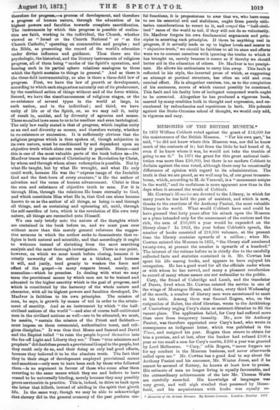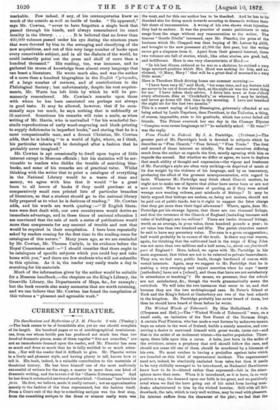MEMORIES OF THE BRITISH MUSEUM.*
Ix 1833 William Cobbett voted against the grant of £16,000 for the maintenance of the British Museum. " For his own part," he said, " he did not know where this Museum was, nor did he know much of the contents of it ; but from the little he had heard of it, even if he knew where it was, he would not take the trouble of going to see it." In 1871 the grant for this great national insti- tution was more than £90,000, but there is no modern Cohbett to declaim against the sum voted, although there may be occasionally differences of opinion with regard to its administration. The truth is that we are proud, as we well may be, of our great treasure. house, which, according to M. de Verneuil, is a " monument unique in the world," and its usefulness is more apparent now than in the days when it aroused the wrath of Cobbett.
Mr. Cowtan's ifemories are devoted to the Library, in which for many years he has held the post of assistant, and which is now, thanks to the exertions of Sir Anthony Panizzi, the moat valuable library in the world. What would Cobbett have said could he have guessed that forty years after his attack upon the Museum as a place intended only for the amusement of the curious and the rich, the sum of £10,000 a year would be expended on the library alone? In 1832, the year before Cobbett's speech, the number of books consisted of '218,000 volumes, at the present time the library contains upwards of a million ; when Mr. Cowtan entered the Museum in 1835, " the library staff numbered twenty-two, at present the number is upwards of a hundred." The interest of the volume before us is chiefly due to the carefully collected facts and statistics contained in it. Mr. Cowtan has spent his life among books, and appears to have enjoyed his occupation. He has a good word for all the officials under whom or with whom he has served, and many a pleasant recollection to record of many whose names are not unfamiliar to the public.
Cary, the friend of Coleridge and Lamb, and the translator of Dante, lived when,Mr. Cowtan entered the service in one of the wings of Montague House, and there, every third Wednesday of the month, a number of literary men were accustomed to meet at his table. Among them was Samuel Rogers, who, on the resignation of Baber, the chief librarian, wrote to the Archbishop of Canterbury urging Cary's claim as assistant-librarian to fill the vacant place. The application failed, for Cary bad suffered more than once from temporary insanity. Mr., now Sir Anthony Panizzi, was therefore appointed over Cary's head, who wrote in consequence an indignant letter, which was published in the Times, and resigned his post. Rogers then strove to obtain for him a pension, and at last, after the banker had refused £100 a year as too small a sum for Cary's merits, £200 a year was granted by Lord Melbourne. "Cary," adds Rogers, "never forgave me for my conduct in the Museum business, and never afterwards called upon me." Mr. Cowtan hue a good deal to say about Sir Anthony Panizzi and his successor, Mr. Winter Jones, and if he cannot be accused of flattery, he knows at least how to praise. His estimate of men no longer living is equally favourable, and the extraordinary achievements of the late Mr. Thomas Watts are carefully recorded. His knowledge of languages was very great, and well nigh rivalled that possessed by Mezzo- fanti, and his acquaintance with books was equally re- * Memories of the British Museum. By Robert Cowtan. London: Bentley. 1672
markable. Few indeed, if any, of his contemporaries knew so much of the outside as well as inside of books. " He appeared," says Mr. Cowtan, "never to have forgotten a single book that passed through his hands, and always remembered its exact
locality in the library It is believed that no fewer than 400,000 volumes passed under his eye during the nineteen years that were devoted by him to the arranging and classifying of the new acquisitions, and out of this very large number of books upon every conceivable subject, and in all the dialects of the world, he could instantly point out the press and shelf of more than a hundred thousand." His reading, too, was immense, and he gathered his stores of knowledge from almost every language that can boast a literature. He wrote much also, and was the author of a more than a hundred biographies in the English Cyclopmdia, of a large number of reviews, and of contributions to the Philological Society ; but unfortunately, despite his vast acquire- ments, Mr. Watts has left little by which he will be per- manently remembered. Mr. Cowtan's remarks upon those with whom he has been associated are perhaps not always in good taste. It may be allowed, however, that if he occa- sionally says too much, he says nothing that is unfriendly or ill-natured. Sometimes his remarks will raise a smile, as when writing of Mr. Harris, who is unrivalled " for his wonderful fac- simile reproductions of early wood-engraving and block-printing to supply deficiencies in imperfect books," and stating that he is a most companionable man, and a devout Christian, Mr. Cowtan adds, that he is looking " to a world of light, where, as I think, his particular talents will be developed after a fashion that he probably never imagined."
Mr. Cowtan is apt occasionally to dwell upon topics of little interest except to Museum officials ; but his statistics will be ser- viceable to readers who dislike the trouble of searching blue- books, and some of his remarks are of practical value. Whilst thinking with the writer that to print a catalogue of everything in the National Library would be a waste of time and money, we agree with him that it would "be a great boon to all lovers of books if they could purchase at a comparatively small sum printed lists of particular branches of literature, so that a student should go to the national library fully prepared as to what he is desirous of reading." Mr. Cowtan adds, and his words are worth quoting :—" If English litera- ture were first dealt with, our own countrymen would derive an immediate advantage, and in these times of national education I am convinced that the sale of such a series of publications would more than compensate for any amount of trouble and cost that would be required in their compilation. I have been repeatedly asked by readers coming for the first time to the reading-room for catalogues of this nature." Many years ago, as we are reminded by Mr. Cowtan, Mr. Thomas Carlyle, in his evidence before the Royal Commission said :—" I should consider that there ought to be catalogues of specific subjects which you could buy and take home with you," and there are few students who will not subscribe to this opinion. As it is, the reader may easily waste a day in searching for his materials.
Much of the information given by the author would be suitable for a Museum handbook,—the chapters on the King's Library, the Grenville Library, the Departments of Maps, &c., for example ; but the book records also many memories that are worth retaining, and we can believe that Mr. Cowtan has found the compilation of this volume a " pleasant and agreeable work."

































 Previous page
Previous page